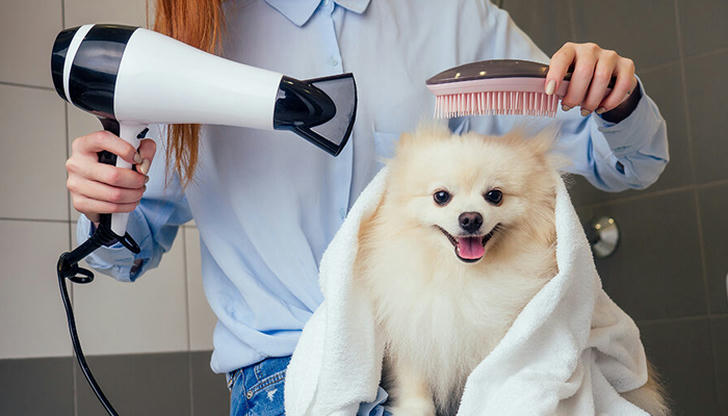Pet Care Made Easy: Practical Tips for a Happy and Healthy Furry Friend
Pets are beloved companions that bring joy, comfort, and companionship into our lives. Whether you have a playful dog, a curious cat, or another type of pet, caring for them is an essential responsibility. Proper pet care not only ensures your furry friend lives a long and healthy life but also helps foster a strong bond between you and your pet. In this article, we will share practical tips to make pet care easy, effective, and rewarding for both you and your furry friend.

I. Introduction
Caring for a pet is not just about feeding and playing; it involves understanding their physical and emotional needs. This article aims to provide simple, actionable pet care tips that will help you maintain a happy, healthy pet while keeping the process manageable and stress-free. Let’s dive into the basics of pet care, from nutrition to exercise, grooming, and health maintenance.
II. Essential Pet Care Basics
1. Feeding Your Pet
A well-balanced diet is crucial for your pet’s overall health. Choosing the right food depends on your pet’s age, size, breed, and activity level. Puppies, kittens, and senior pets have different nutritional needs than adult pets. Always opt for high-quality pet food that lists meat as the primary ingredient, and ensure it meets the nutritional standards set by authorities like AAFCO (Association of American Feed Control Officials).
How to Choose the Right Food: Look for pet food that is formulated for your pet's age and size. Puppies and kittens need food with higher protein levels, while older pets may need food with more joint support and fewer calories to prevent obesity.
Feeding Schedule: Most pets, especially dogs, thrive on a consistent feeding schedule. For adult dogs, two meals a day are generally recommended. Cats often do well with several small meals throughout the day. Always follow the portion guidelines on the food label to avoid overfeeding or underfeeding.
2. Hydration
Access to fresh, clean water is just as important as a balanced diet. Proper hydration supports your pet’s bodily functions, including digestion, circulation, and temperature regulation.
- How to Ensure Hydration: Keep a clean water bowl accessible at all times. Some pets prefer running water, so you may want to consider a pet water fountain. Make sure to change the water regularly to keep it fresh.
3. Exercise and Mental Stimulation
Physical exercise is essential for your pet's health. It helps maintain a healthy weight, keeps their muscles strong, and prevents behavioral problems related to boredom. Mental stimulation is equally important, especially for intelligent pets like dogs and cats.
Exercise for Dogs: Daily walks are essential for dogs, especially larger breeds. Dogs also enjoy interactive play, such as fetch, tug-of-war, and obedience training.
Exercise for Cats: Cats may not need daily walks, but they require playtime to stay active. Use toys like laser pointers, feather wands, or interactive puzzles to keep your cat engaged.
4. Grooming and Hygiene

Regular grooming keeps your pet comfortable, healthy, and clean. It can also be a bonding experience for you and your pet.
Brushing: Brushing your pet’s fur regularly prevents matting and reduces shedding. Long-haired pets, like Persian cats or Golden Retrievers, require more frequent brushing compared to short-haired breeds.
Bathing: Bathing depends on the breed and activity level of your pet. Dogs may need baths every 1-3 months, while cats typically groom themselves, requiring baths only in specific situations (e.g., getting into something sticky).
Nail Trimming and Ear Cleaning: Trim your pet’s nails regularly to prevent them from becoming too long and causing discomfort. Clean your pet’s ears, especially if they are prone to infections, by using a pet-safe ear cleaner.
III. Preventative Health Care
1. Regular Veterinary Visits
Annual vet visits are essential to maintaining your pet’s health. Your veterinarian will conduct thorough check-ups, vaccinations, and screenings for parasites, dental issues, and other health concerns.
Vaccinations: Keep your pet’s vaccinations up to date to prevent diseases like rabies, parvovirus, and distemper in dogs, and feline leukemia and rabies in cats.
Flea and Tick Prevention: Consult with your vet about the best flea and tick prevention products for your pet.
2. Dental Care
Dental health plays a major role in your pet's overall well-being. Plaque buildup can lead to gum disease, which may result in tooth loss and other serious health issues.
Brushing Teeth: Brush your pet’s teeth with pet-safe toothpaste and a soft-bristled brush. Ideally, brush your pet’s teeth several times a week.
Dental Treats and Chews: There are various dental chews and treats available that help reduce plaque buildup and freshen your pet’s breath.
3. Parasite Control

Parasites such as fleas, ticks, and worms can cause discomfort and health issues for your pet. Make sure to regularly check for signs of parasites, such as excessive scratching or unusual behavior.
- Preventative Treatments: Monthly flea and tick treatments, along with worming treatments, should be part of your pet’s regular health care routine.
IV. Behavioral and Emotional Health
1. Creating a Safe and Comfortable Environment
A stable and secure environment is key to your pet’s emotional well-being. Make sure your pet has a quiet space to retreat to when they need rest or alone time.
- Pet Space: Provide a cozy bed, blanket, or crate where your pet feels safe. Cats often appreciate having a perch or hideaway where they can observe their environment.
2. Training and Socialization
Training is essential for good behavior and socialization. It helps reduce problem behaviors and makes your pet easier to manage in different situations.
Basic Training: Teach your dog basic commands like sit, stay, and come, using positive reinforcement such as treats and praise.
Socialization: Expose your pet to new people, places, and other animals to help them feel comfortable in different situations.
3. Recognizing Stress and Anxiety
Pets experience stress, anxiety, and fear, just like humans. Common signs of anxiety include excessive barking, chewing, or hiding.
- Ways to Help Your Pet Cope: Create a calm environment, provide plenty of exercise, and use anxiety-reducing products like calming sprays, pheromone diffusers, or anti-anxiety vests.
V. Special Considerations for Different Pets

1. Dogs
Dogs require regular exercise, socialization, and grooming. Pay attention to the unique needs of your dog’s breed, as some breeds have specific health concerns.
2. Cats
Cats are more independent than dogs but still require attention, play, and a clean litter box. Provide them with scratching posts, and ensure they have space to retreat when needed.
3. Other Pets (e.g., Rabbits, Guinea Pigs, Birds)
Rabbits: Need space to hop around and chew-safe toys to prevent boredom. Provide fresh hay, vegetables, and pellets as part of their diet.
Guinea Pigs: Social creatures that thrive in pairs or groups. Offer fresh vegetables and hay, along with regular cage cleaning.
Birds: Birds need mental stimulation and room to fly. Provide them with a spacious cage, toys, and daily out-of-cage playtime.
VI. Emergency Preparedness
1. First Aid for Pets
Having basic first aid knowledge can be invaluable in an emergency. Learn how to handle common injuries, such as cuts, choking, and poisoning, and always have the number for your local emergency vet handy.
2. Pet Identification and Safety
Ensure your pet has proper identification in case they get lost. This could be through a collar with a tag, a microchip, or both.
- Pet-Proofing: Make your home safe by removing dangerous items like toxic plants, small objects that could be swallowed, and securing windows or doors.
VII. Conclusion
Taking care of a pet is a rewarding and fulfilling experience. By following these simple yet effective tips, you can ensure that your furry friend remains healthy, happy, and well-cared for. Regular vet visits, proper nutrition, plenty of exercise, and lots of love will go a long way in fostering a positive and lasting relationship with your pet. Pet care may seem like a lot at first, but by breaking it down into manageable tasks, it becomes an enjoyable part of daily life. Keep your furry companion healthy, safe, and loved, and they will return the favor with loyalty and affection for years to come.
